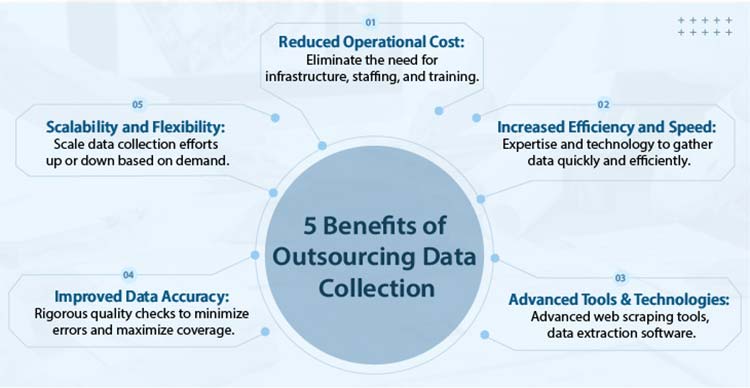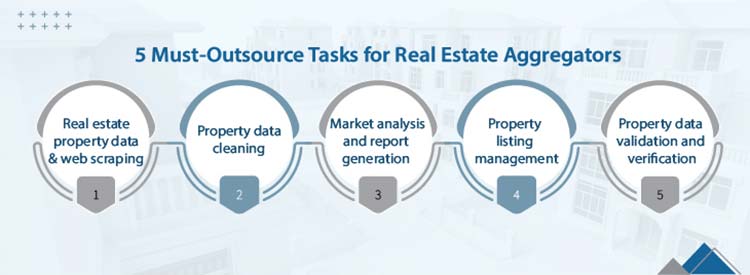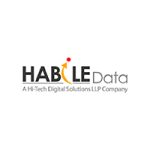For real estate data aggregators, it is increasingly difficult to manage the data influx internally. Outsourcing pays rich dividends and remains central to their business strategy, flexibility, scalability, sustainability and profitable growth.
In real estate, data is both an asset and a complex challenge. Real estate data aggregators play a crucial role in transforming scattered data such as property listings, market trends, and buyer behavior into actionable insights that drive significant decisions. However, as the volume of data grows, so do the challenges in maintaining its accuracy and relevance.
Contents
As competition intensifies, it becomes increasingly difficult for aggregators to manage the data influx internally. This is where outsourcing becomes a strategic solution. Forward-thinking aggregators understand the importance of delegating key tasks such as data collection, cleansing, and validation to specialized partners who offer both expertise and advanced tools. Precision is paramount in this industry, and even minor errors can jeopardize potential deals. Outsourcing real estate data collection tasks not only streamlines operations but also provides a competitive edge in a market where data is the key to success.
5 key benefits of outsourcing for real estate data aggregators
Outsourcing isn’t just about offloading work. It’s about scaling efficiently. It allows aggregators to focus on what matters: delivering sharper, faster insights to their clients. It’s about using external talent to fuel internal growth. In a market where data drives the game, the right partners help aggregators stay ahead, turning raw information into a strategic advantage. That’s how you move from managing data to mastering it.

- Cost effective operations: Outsourcing eliminates the need for maintaining full-time in-house staff, significantly reducing overhead costs associated with salaries, benefits and training.
- Access to Specialized Skills: Engaging external partners provides access to niche expertise in data analysis, machine learning, and compliance, ensuring that aggregators can deliver high-quality insights without the learning curve.
- Advanced Tools and Technologies: Outsourcing grants access to cutting-edge web scraping tools, data extraction software, and quality assurance processes that might be expensive to implement in-house.
- Focus on Core Functions: By outsourcing non-core tasks, data aggregators can concentrate on strategic initiatives, such as enhancing data accuracy and developing client relationships, driving long-term growth.
- Scalability and Flexibility: Quickly scale operations in response to market demands, allowing aggregators to adapt to changing conditions without the constraints of fixed resources.
5 tasks real estate data aggregators should outsource
Outsourcing key tasks is essential for real estate data aggregators looking to scale. By entrusting specialized partners with critical functions and implementing real estate data collection best practices, aggregators can focus on core business activities while ensuring high data quality and operational efficiency.

Task 1 – Real estate data collection and web scraping
Real estate data collection mainly involves gathering information on properties, market trends, and consumer behavior from various online sources. Web scraping is a technique used to automate this process by extracting data from websites, allowing real estate data aggregators to compile extensive databases of property listings, pricing trends, and other relevant information.
By outsourcing data collection, real estate aggregators can ensure that their property listings remain comprehensive and up to date. Specialized firms are equipped with the latest scraping technologies and methodologies that allow for the continuous monitoring of market changes and new listings. The combination of MLS APIs and web scraping enhances real estate listings by automating data collection and ensuring accuracy.
Challenges in real estate data collection
- Time-Consuming Process: Manual data collection demands significant labor and resources, slowing down operations and creating bottlenecks in efficiency.
- Human Error: Manual data entry is prone to mistakes, which can lead to compromised data accuracy and poor-quality insights.
- Inaccuracies Impact Decisions: In a precision-driven industry like real estate, inaccurate data can result in misguided decisions and lost business opportunities.
- Difficulty in Staying Updated: Property listings change frequently, making it challenging for manual processes to keep data relevant and up to date in a fast-moving market.
Benefits of outsourcing real estate data collection
- Cost Efficiency: Reduces the need for large in-house teams, cutting operational costs associated with manual data entry and management.
- Enhanced Accuracy: External experts leverage advanced technologies to ensure reliable, high-quality data that is both accurate and actionable.
- Focus on Core Operations: Frees internal teams to focus on more strategic tasks like data analysis and business growth, rather than tedious data collection.
- Improved Resource Allocation: Allows businesses to optimize their resources, directing them toward areas that drive growth and customer satisfaction.
- Scalability: Offers flexibility to scale operations up or down as market conditions shift without the burden of managing in-house teams.
- Competitive Advantage: By outsourcing, businesses can stay ahead of the curve, responding quickly to emerging opportunities and maintaining a competitive edge.
Task 2 – Property data cleaning
Accurate real estate data is the foundation of success in real estate, making data cleaning and validation crucial steps to ensure datasets are error free, consistent and ready for analysis. By addressing issues like duplicates and incomplete information, data cleaning keeps information reliable, while validation ensures data meets high-quality standards of accuracy and completeness. In the competitive real estate industry, clean and validated data is essential for providing accurate listings, generating reliable market insights, and making informed decisions.
Outsourcing data cleaning and validation offers real estate data aggregators a strategic advantage. Specialized providers leverage advanced tools, automation and expertise to efficiently manage large datasets. This allows real estate companies to handle vast amounts of data without sacrificing precision or quality. By outsourcing, aggregators can ensure their data is always up-to-date and reliable, without the burden of managing these complex processes in-house.
Challenges in property data cleaning
- Time-Consuming Process: Cleaning large datasets manually can be labor intensive, especially for real estate aggregators dealing with high volumes of listings and data sources.
- Human Errors: Relying on manual processes increases the risk of errors, leading to inaccurate or incomplete data.
- Scalability Issues: As datasets grow, managing them efficiently becomes more challenging, especially without automated tools or dedicated teams.
Key benefits of outsourcing property data cleaning
- Efficiency in Handling Large Data Volumes: Specialized firms use advanced tools to process data faster and more accurately.
- Cost Savings: Outsourcing reduces the need for extensive internal teams dedicated to data management.
- Expertise: External partners bring niche skills and technologies that improve data quality.
- Scalability: Easily manage growing datasets without overburdening internal resources.
Outsource your real estate tasks and grow efficiently.
Consult us today»Task 3 – Market analysis and report generation
Market analysis isn’t just about crunching numbers; it’s about reading the pulse of the market. Trends, pricing, demand patterns all tell a story about where the market is headed. For investors, developers and real estate firms, that story is everything. It’s the difference between smart decisions and costly mistakes. Understanding these dynamics means seeing the future before it happens and positioning yourself to capitalize on it.
Now, why outsource this? Because the best real estate solutions come from the best tools and minds. Specialized analysts with advanced methodologies go deeper and faster than any in-house team ever could. They don’t just process data; they turn it into actionable insights, offering a clearer, more accurate picture of the market’s current state and future direction. For real estate data aggregators, this isn’t just an advantage; it’s a crucial edge. It means delivering smarter, sharper insights to clients, staying ahead of the competition, and driving real value.
Challenges in market analysis and report generation
- Data Overload: Managing vast amounts of data can overwhelm teams and lead to delays.
- Inconsistent Data: Data from multiple sources often lacks standardization, making accurate analysis difficult.
- Rapid Market Changes: Keeping reports current in fast-moving markets is challenging.
- Technological Gaps: Without advanced tools, in-depth analysis becomes inefficient.
- Resource Intensive: Generating detailed, accurate reports requires significant time and expertise, often stretching internal resources.
- Balancing Speed and Accuracy: Delivering fast, high-quality reports can be difficult without compromising one for the other.
Benefits of outsourcing market analysis and report generation
- Faster Delivery: Outsourced teams can generate reports quickly, ensuring timely market insights.
- Data-Driven Insights: Specialized firms use the latest tools to analyze trends and provide high-quality, actionable data.
- High-Quality Content: Outsourcing ensures reports are professionally crafted with in-depth analysis, adding credibility and value for stakeholders.
By outsourcing both market analysis and report generation, real estate aggregators can streamline processes, provide superior insights to clients, and maintain a competitive advantage in a fast-paced market.
Task 4 – Property listing management
Property listing management is the engine that keeps real estate moving. It’s not just about updating prices or adding a few photos; it’s about making every detail work for you. Accurate, up-to-date listings build trust, and trust is what gets buyers and sellers to act. When your listings are consistent across platforms, you’re not just showing properties; you’re driving decisions. Every update, every tweak adds value, boosts your visibility, and pushes deals forward. The market moves fast, and the better your listing management the faster you stay ahead and overcome property listing data challenges. That’s how you win in real estate.
Challenges in property listing management
- Platform Inconsistencies: Managing listings across multiple platforms can lead to discrepancies in pricing, availability, and property details if not consistently updated.
- High Volume of Listings: As companies, property data collection and real estate property listing becomes increasingly difficult, leading to potential errors or outdated information.
- Manual Updates: Relying on manual processes for updating listings is time-consuming and prone to errors, impacting the accuracy of the data.
- Technological Barriers: Without advanced tools or automation, keeping property information up to date across different platforms can be inefficient, leading to delays and reduced visibility.
- Compliance with Market Standards: Ensuring listings meet local, regional, and platform-specific standards can be a challenging and complex task, especially when managing a large number of properties.
Benefits of outsourcing property listing management
- Accuracy and Timeliness: Outsourcing ensures property listings are updated regularly with accurate information, preventing outdated data that can harm client trust.
- Reduced Workload: By delegating the task to external specialists, real estate firms can focus on core operations while ensuring listings are professionally maintained.
- Cost-Effective: Outsourcing eliminates the need to hire in-house staff for listing management, lowering operational costs.
- Enhanced Scalability: External partners can easily handle high volumes of listings as real estate companies grow, ensuring consistent quality across platforms.
- Access to Technology: Specialized firms often use advanced tools and software to manage listings more efficiently, improving overall performance and visibility.
Task 5 – Property data validation and verification
Property data validation is the difference between certainty and risk. Cross-checking details such as ownership, zoning, and legal status ensures you’re working with the truth. It’s how you prevent fraud, avoid mistakes, and stay compliant. In real estate, validated data isn’t just reliable; it’s power. For buyers, sellers, and professionals, it’s the confidence to move forward without second-guessing. Technologies such as machine learning offer real-time validation by detecting inconsistencies instantly. Additionally, third-party validation tools cross-reference data with external sources. like public records and legal documents.
Challenges in property data validation and verification
- Data Inconsistencies: Property data often comes from various sources, such as public records, MLS listings, and private databases, leading to inconsistencies that need to be reconciled.
- Time-Intensive Process: Manually verifying property data across different platforms and sources is a time-consuming task, especially with large datasets.
- Regulatory Compliance: Ensuring that property data adheres to legal and regulatory standards is a complex and ongoing challenge, particularly in jurisdictions with varying property laws.
- Risk of Errors: Manual verification processes are prone to errors, which can lead to incorrect property records, legal disputes, or flawed transaction decisions.
Benefits of outsourcing property data validation and verification
- Increased Accuracy: Outsourcing to property data management experts ensures that property data is cross-checked against multiple verified sources, reducing errors and improving data quality.
- Efficiency: External specialists utilize advanced tools and technologies to streamline the validation process, making it faster and more reliable than manual efforts.
- Compliance Assurance: Outsourcing partners are well versed in regulatory requirements and help ensure that property data complies with local, state and national laws, reducing legal risks.
- Scalability: Handle growing datasets and the increasing complexity of real estate portfolios, ensuring that data validation keeps pace with business growth.
- Focus on Core Activities: By delegating data verification tasks, real estate firms can focus on core business functions, such as client services and market analysis, without getting bogged down by data management tasks.
How to choose the right outsourcing partner for real estate data aggregation
Selecting the right outsourcing partner for real estate data aggregation is crucial for success. Key factors to consider include the partner’s expertise in real estate data, a strong reputation in the industry, competitive cost structures, scalability to accommodate growth, and effective communication. It’s essential to set clear goals and expectations from the outset to ensure alignment. Regular check-ins and open communication will help maintain a productive relationship. Ensure your partner is flexible and transparent, and continuously monitor performance to achieve the desired outcomes, maximizing value from your outsourced data aggregation efforts.
Conclusion
In real estate data aggregation, the right outsourcing partner gives you a competitive advantage. You need a team with the expertise to handle complex data, a reputation built on results, and the capability to scale alongside your business.
Don’t choose based on cost alone; choose based on the overall value and factors such as accuracy, efficiency, and impact. Set your expectations clearly from the start and watch how the right partner transforms your operations into a well-oiled machine, driving growth and delivering results that matter. After all, precision is profit, and there’s no room for compromise.
Want to increase efficiency and boost profitability?
Talk to our experts»
HabileData is a global provider of data management and business process outsourcing solutions, empowering enterprises with over 25 years of industry expertise. Alongside our core offerings - data processing, digitization, and document management - we’re at the forefront of AI enablement services. We support machine learning initiatives through high-quality data annotation, image labeling, and data aggregation, ensuring AI models are trained with precision and scale. From real estate and ITES to retail and Ecommerce, our content reflects real-world knowledge gained from delivering scalable, human-in-the-loop data services to clients worldwide.






